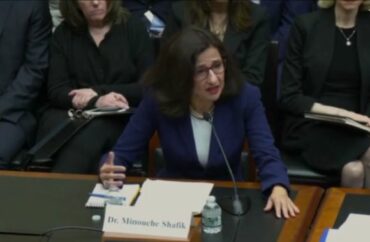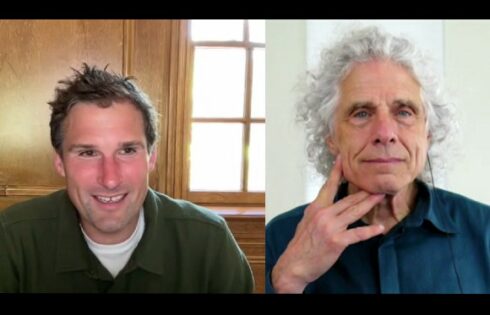
School calls it part of ‘well-known playbook’
Columbia University criticized a plagiarism allegation levied against its president, calling the claim “absurd.”
Yale University Professor Ahmed Mobarak accused President Minouche Shafik of “wholesale intellectual theft,” in reference to a 30-year-old paper that is almost identical to a study she co-authored in 1992.
The 1994 paper no longer listed Sushenjit Bandyopadhyay as a co-author, but Shafik (pictured) did give him “special thanks.”
The university dismissed the claim and other scholars have questioned the seriousness of the allegation.
“This is an absurd attempt at running a well-known playbook, and it has no credibility,” Ben Chang, vice president of communications, said in an email to The College Fix.
He did not respond to a follow-up inquiry sent in the past week and a half that asked for further information and for any additional context on the allegation.
Other academic leaders have faced plagiarism allegations, including Harvard University’s Claudine Gay, who resigned in the wake of criticism for her handling of antisemitism on campus and the dishonesty charges.
Bandyopadhyay, who currently works as a senior consultant with the World Bank, did not respond to a LinkedIn message from The Fix.
“I’m an academic, and this is NOT okay to do,” Yale Professor Mobarak wrote in an April 26 thread on X.
“You cannot remove an author and claim intellectual property for yourself. When a grad student tried this, we referred him to [the] Dean for disciplinary hearings,” Mobarak wrote. “And this is worse because of power imbalance – she removed a *junior* person.”
Nemat Shafik – @Columbia Prez only has 1 well-cited publication in her life, in Oxford Econ Papers 1994.
This paper is lifted almost entirely from a 1992 report coauthored with consultant not credited in the publication.
This is wholesale intellectual theft, not subtle plagiarism pic.twitter.com/ttqN3C7hFm— Mushfiq Mobarak, @mushfiq-econ.bsky.social (@mushfiq_econ) April 26, 2024
The 1992 report is called “Economic Growth and Environmental Quality: Time Series and Cross-Country Evidence” and the 1994 paper is titled “Economic Development and Environmental Quality: An Econometric Analysis.”
The papers are by far Shafik’s most cited. The 1992 one has been cited 2,816 times per Google Scholar data, the 1994 one 2407. The next most cited comes in at 115. The majority of Shafik’s work has been cited less than one hundred times.
Mobarak did not respond to a Fix request for comment on May 15 and May 20. He is reported as saying in a New York Post article that he spoke with Bandyopadhyay, who felt that he should have had his name on the paper, but did not blame Shafik.
Jonathan Bailey of Plagiarism Today questioned the seriousness of the claims, compared to other plagiarism scandals.
He wrote “there’s no clear proof of wrongdoing” and “[w]hile I agree that the situation is unusual, it’s not proof of plagiarism by itself.”
He said it is possible Bandyopadhyay’s role changed from the draft stage to the final version. He alternatively suggested the removed author may not have contributed as much to the first version and was mistakenly added.
“It is premature to accuse Shafik of plagiarism or authorship integrity violations without knowing why Bandyopadhyay was dropped as a coauthor,” Bailey wrote. “While it is unusual, it’s not, by itself, an indication of plagiarism or other wrongdoing.”
“This is a classic case of seeing [something] unusual and jumping to the most egregious conclusion. It is technically possible, but we have to eliminate some more mundane explanations first.”
MORE: UCLA med school DEI leader accused of plagiarism doesn’t respond to allegations
IMAGE: House Committee on Education and the Workforce/YouTube
Like The College Fix on Facebook / Follow us on Twitter






Please join the conversation about our stories on Facebook, Twitter, Instagram, Reddit, MeWe, Rumble, Gab, Minds and Gettr.